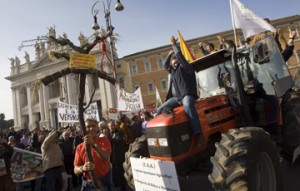
Globe & Mail | 16 November 2009
Race by foreign investors to secure food supply through land purchases can be 'win-win' proposition, FAO says
Eric Reguly
Rome — From Tuesday's Globe and Mail Published on Monday, Nov. 16, 2009 10:35PM EST
Libyan leader Moammar Gadhafi calls it the “new feudalism.” Groups representing peasant farmers call it “land grabs.” The United Nations literature dispersed at this week's UN food summit in Rome calls it “direct foreign investment.”
That's not exactly what the UN called it a year and a half ago, when record-high food prices triggered riots in dozens of countries and threatened famine in some of the poorest nations. Then, Jacques Diouf, the director-general of the UN's Food and Agricultural Organization, said the global farmland rush could be interpreted as a form of “neo-colonialism.”
Since then, the FAO has softened its stand. It admits foreign investors' purchases of farmland in poor countries do not always benefit local farmers and food markets. But they can be “win-win” deals if the fresh capital delivers new technology to raise crop yields, provides employment and improves domestic food security.
Whatever the name, the race by foreign investors to lock up food supplies by collecting productive farmland outside their own countries has become the hot-button issue at the food summit. Addressing the summit Monday, the first day of the three-day event, Mr. Gadhafi became an unlikely ally of smallholder farmers with his warning that they “are being bereft of their own land thanks to the new feudal power coming from outside of Africa and buying up land very cheaply.”
Farm protection and watchdog groups such as Grain and La Via Campesina suspect the UN's new position reflects the general belief that the land deals are unstoppable, meaning the UN has to learn to work with them instead of against them. They also note that the UN is wary of biting the hand that feeds it. Saudi Arabia, one of the biggest foreign farmland collectors, is one of the top sponsors of FAO and the other UN food agencies. It is also financial sponsor of the Rome food summit.
The watchdog groups fear the land-buying spree violates the rights of poor farmers, who may be thrown off the land they cannot prove they own, and is contributing to local food shortages. In most cases, the farms' production is exported directly back to the investors' home country, bypassing the international food-commodity markets.
A recent Grain report said the farm deals amount to “the siphoning of fertile and probably contested agricultural lands to rich foreigners.”
Some of the groups think Canada, with its vast tracts of fertile Prairie farmland, will be the foreign investors' next target. They believe the investors will find a way around the foreign or non-resident ownership restrictions in Manitoba, Saskatchewan and Alberta that prevent them from buying. Or they expect the restrictions to melt away as farmland values rise, giving Canadian owners an incentive to sell to the highest bidder in a global land market.
“It will come to Canada and it will be called corporate investment, not land grabs,” said Nettie Wiebe, a Saskatchewan farmer and St. Andrew's College professor who is in Rome this week to protest against what she views as the UN's implicit support for the land deals.
Stephen Johnstone, a partner in the Calgary private equity fund Agcapita, which buys Canadian farmland for Canadian investors, said massive amounts of Prairie farmland would get snapped up overnight if it weren't for the ownership restrictions. “We're contacted weekly by foreign investors,” he said.
The watchdog Grain has been investigating “land grabs” for a year and a half and estimates that 40 million hectares of farmland, worth $100-billion (U.S.), have been bought or leased in Africa, Asia and Latin America. The UN says data on foreign direct investment in farmland is hard to come by, but estimates that foreign investors – governments, sovereign wealth funds, private equity funds – have bought or leased 20 million hectares in Africa alone in the past three years.
Saudi Arabia, the Gulf states, China and South Korea are among the biggest buyers of farmland. India, Japan, Israel and Jordan also are buyers. Sudan, where the UN's World Food Program is feeding millions of people, is one country that encourages farmland sales to foreigners.
Another is Georgia. At the food summit, Georgia's ambassador to Italy, Konstantin Gabashvili, said his country has been selling farmland to the Saudis, Israelis and Chinese and welcomes the investments. “We are very open to the process of [food] globalization,” he said.
The FAO, along with the UN's sister food agencies and the World Bank, are trying to develop a voluntary international code of conduct “highlighting the need for transparency, predictability, sustainability and stakeholder involvement” to govern the land deals.
Speaking on the fringes of the UN food summit, Grain co-founder Renée Vellvé said she doesn't believe in the “win-win” scenario because the voluntary codes of conduct, by definition, cannot be enforced, and because many of the investing countries lack productive farmland and will pay virtually anything to ensure their populations get fed. “It's all about fear,” she said. “Saudi Arabia is worried about security of supply.”
Saudi Arabia has been particularly aggressive in buying farmland since it dropped its policy two years ago of wheat self-sufficiency. The effort, which involved using vast amounts of water to turn desert into farms, was too expensive, with farmers getting subsidies of as much as $1,000 a tonne.
Mr. Johnstone, of Agcapita, thinks the rush to buy farmland in poor countries to lock up the food supplies and export them back to the investing country is ultimately doomed. If a new food crisis emerges, local populations will not tolerate food exports. “I think the Saudis and the Chinese will shrink away from foreign farmland purchases when they realize the political risk,” he said. “If food goes short, governments will nationalize the farms.”










